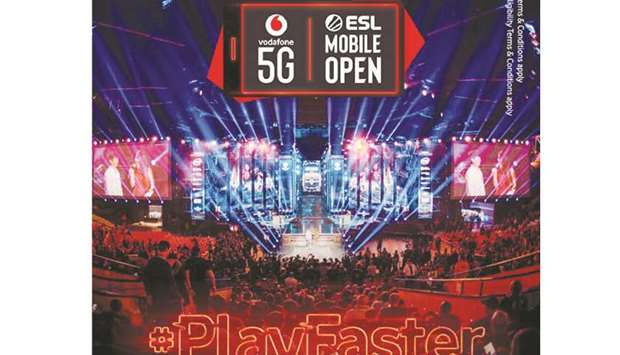More than 2.5bn active gamers sustain a multi-billion-dollar global gaming industry.
Much of the industry’s growth is fuelled by advances in digital technology. Faster and more reliable Internet connections, smart phones, and 3D design software have turned today’s best-selling games into immersive, close to cinematic thrill-rides.
Smartphones have put these gaming experiences right in our pockets and we’re heading to a future where gamers may need nothing more than access to the Internet to instantly play on any device. The demand for a super high-quality, high-speed Internet connection has never been greater.
The kind of seamless connectivity the industry needs to elevate current gaming experiences is now possible with 5G Internet connectivity. With ultra-low latency and lightning fast speeds, 5G seems purpose-built to have a positive disruptive effect on the gaming industry.
Renowned gaming pro, Tom Cassell, in a recent demo for e-sports fans in Birmingham, UK which was live streamed on Vodafone 5G, enthused: “5G is completely changing the landscape when it comes to gaming on the go.”
l 5G Speeds
With the speeds that 5G is capable of achieving, it takes only seconds to download a full HD film. In gaming, such fast Internet speeds mean quick reaction times.
The technological advances behind 5G’s remarkable speeds are: Massive MIMO, a new form of radio antenna that is much more effective than a single broad signal and results in less interference. The second is new spectrum, which can deliver faster speeds and greater capacity.
Instant reaction times will finally give gamers the experience of a seamless, lag-free gaming interaction.
l5G Low Latency
For gamers, even a split-second lag due to high network latency – the time it takes devices to communicate with each other’s wireless networks – can be the difference between winning and losing. With 5G promising ultra-low latency, the immersion breaking lag will be a thing of the past in gaming.
The technology behind 5G’s low latency includes faster radio processing. New technology allows the radio signal to be processed more quickly. The second is Multi-Access Edge Computing (MEC). Purpose-built Edge Technology Centres (ETC) shorten the distance for the signal to travel, thereby reducing the latency.
With these latency improvements, 5G also creates the space to innovate and the possibility of combining gaming with 5G and augmented reality (AR) for multiplayer mobile AR gaming. A truly seamless experience, however, requires the low latency that 5G offers.
Vodafone is Leading Digital Innovation
In Qatar, the transformative potential of 5G is already closer to reality for mobile gamers since Vodafone Qatar switched on its 5G network a year ago. Vodafone 5G offers the ‘real-time’ connectivity to open the doors to brand new experiences and applications, including new levels of gaming performance.
l Competitive Gaming
Millions of e-sports enthusiasts will have the chance to see the real-time potential of a 5G network during the Vodafone 5G ESL Mobile Open being hosted in Milan on September 28 and 29.
Vodafone has partnered with ESL, the world’s largest e-sports company, to launch the world’s first international mobile e-sports tournament to feature live finals played over a mobile 5G network.
The tournament will show millions of gaming fans around the world the potential of Vodafone’s 5G low latency streaming to help players reach new levels of gaming performance while fans can experience the thrill of a streamed professional gaming performance.
l A 5G Future for Gaming
Low-latency and high-speed Internet is key for gaming and Vodafone is leading digital innovation to bring gamers and e-sports enthusiasts both – with real time 5G connectivity.
With network speeds faster than the blink of an eye, Vodafone 5G will usher in truly immersive experiences on devices from virtual to augmented reality. Such innovations are making the future of gaming a reality.

5G will not only enhance the gaming experience, but totally transform it.
